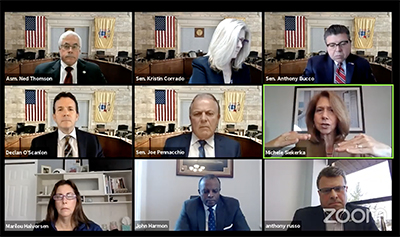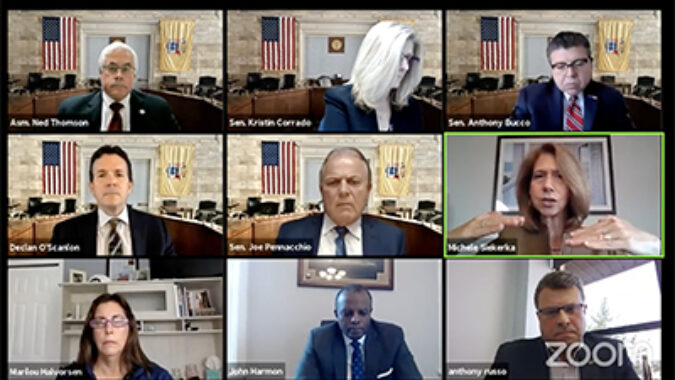
NJBIA President & CEO Michele Siekerka testifying today at a hearing on the impact of COVID-19 business restrictions on the state’s economy.
What New Jersey businesses need, even more than state and federal aid, is the ability to fully and safely reopen, NJBIA President & CEO Michele Siekerka told an independent legislative panel examining what a year of COVID-19 business closures and operating restrictions have done to the state’s economy.
“We can reopen now responsibly and safely,” Siekerka said Friday during the Facebook Live broadcast of the Independent Hearing on Businesses, Jobs and the New Jersey Economy. “All along we have asked that when a business can check the safety boxes, to let them open. The health, safety and welfare of their workforce is tantamount as well as that of their clients, customers and vendors.”
With more than a million New Jersey residents now fully vaccinated, and COVID-19 hospitalizations leveling off and even declining in some regions of the state, Siekerka and other business leaders expressed frustration with the state’s slow pace in lifting restrictions that have limited business operations.
“If data determines dates and public health drives economic health, then we should be there,” Siekerka said. “We see daily that hospital capacity has remained within pre-COVID ranges. Isn’t that the key metric we should be watching?”
Siekerka noted New Jersey’s unemployment rate in January was 7.9% – one of the worst in the nation. The number of New Jersey small businesses open as of March 3 has declined 32.2% compared to January of 2020, but the situation is significantly worse for hospitality businesses, which are down 49.9% during the same time period.
As parents can’t get back to work if their children do not have safe childcare available to them, Siekerka shared data from the childcare industry, which had a workforce of approximately 87,000 prior to COVID-19. This industry is struggling to survive under state-ordered licensing restrictions put into place during COVID, which make it difficult for them to operate.
“Out of 4,200 registered childcare centers, 1,800 have not opened. That’s 42% that are still closed. And for those open, revenues are down 50% to 60%,” Siekerka said. Further, because of the restrictions on adult to child ratios, we are told that families are being turned away, she said.
State rules related to operating capacities for different businesses are inconsistent, Siekerka said. Many businesses in the events industry, for example, are venues with vast amounts of indoor and outdoor space that can accommodate hundreds of people safely, but the state limits their capacity to an unreasonable number that keeps changing, making it difficult to do any long-term planning, she said.
Siekerka said the New Jersey Business Coalition, which includes NJBIA and more than 100 business and nonprofit leaders, has worked together over the past year to offer data and solutions, but its recommendations, such as regional reopenings instead of the current statewide one-size-fits-all mandates, have not been accepted by state policymakers. The coalition continues to hold virtual town hall meetings to amplify the voices of struggling business owners.
Senator Declan O’Scanlon (R-13) asked Siekerka and the other business leaders at the hearing if the Murphy administration has told them what scientific data and milestones must be reported for businesses to fully reopen. The business leaders replied that they had not been given that information.
“Through the New Jersey Business Coalition, these are the exact things, Senator, that we have asked for,” Siekerka said. “It’s one thing to report out numbers every day, and it’s another thing to tell us where the goalpost is.”
To view a recording of the entire hearing, go here.

